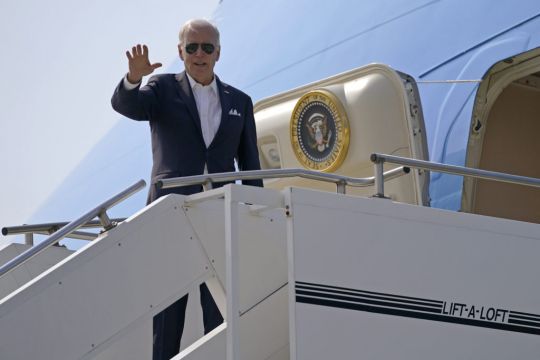US President Joe Biden has tended to both business and security interests as he wrapped up a three-day visit to South Korea.
Mr Biden first showcased Hyundai’s pledge to invest at least 10 billion dollars (£8 billion) in electric vehicles and related technologies in the US, and later mingled with troops at a nearby military base.
Mr Biden’s visit to Osan Air Base, where thousands of US and South Korean service members monitor the rapidly evolving North Korean nuclear threat, was his final stop before he arrived in Tokyo later on Sunday.
“You are the front line, right here in this room,” Mr Biden said in a command centre with maps of the Korean peninsula projected across screens on a wall. Afterwards, Mr Biden chatted with troops and their dependents at the base’s bowling alley.

It was a day that brought together two key messages that Mr Biden is trying to project during his first trip to Asia as president.
At a time of high inflation and simmering dissatisfaction at home, Mr Biden emphasised his global mission to strengthen the American economy by convincing foreign companies such as Hyundai to launch new operations in the United States.
And he wanted to demonstrate solidarity with nervous Asian allies who live in the shadow of North Korea’s nuclear weapons and grew sceptical of US security commitments while Donald Trump was in office.
Earlier, Mr Biden brushed aside questions about any possible provocation by North Korea, such as testing a nuclear weapon or ballistic missile, during his trip, saying: “We are prepared for anything North Korea does.”
Asked if he had a message for the country’s leader, Kim Jong Un, Mr Biden offered a clipped response. “Hello. Period.”
It was another sharp departure from his predecessor, Mr Trump, who once said he “fell in love” with Mr Kim.

Hyundai’s investment includes 5.5 billion dollars for an electric vehicle and battery factory in Georgia.
Appearing with the US leader, Hyundai chief executive Euisun Chung said his company would spend another five billion on artificial intelligence for autonomous vehicles and other technologies.
“Electric vehicles are good for our climate goals, but they’re also good for jobs,” Mr Biden said. “And they’re good for business.”
The major US investment by a South Korean company is a reflection of how the US and South Korea are leveraging their longstanding military ties into a broader economic partnership.
The US president has made greater economic co-operation with South Korea a priority, saying on Saturday that “it will bring our two countries even closer together, cooperating even more closely than we already do, and help strengthen our supply chains, secure them against shocks and give our economies a competitive edge”.
The pandemic and Russia’s invasion of Ukraine in February has forced a deeper rethinking of national security and economic alliances.

Coronavirus outbreaks led to shortages of computer chips, autos and other goods that the Biden administration says can ultimately be fixed by having more manufacturing domestically and with trusted allies.
Mr Biden’s meeting on Sunday with Hyundai’s chief comes after the president made an earlier stop at a computer chip plant run by Samsung, the Korean electronics giant that plans to build a 17 billion dollar (£13.6 billion) production facility in Texas.
Hyundai’s Georgia factory is expected to employ 8,100 workers and produce up to 300,000 vehicles annually, with plans for construction to begin early next year and production to start in 2025 near the unincorporated town of Ellabell.
Before meeting Hyundai’s chief, Mr Biden attended Mass at his hotel in Seoul along with some White House staff.
Along with Korean President Yoon Sook Yeol, Mr Biden on Saturday announced they will consider expanded joint military exercises to deter the nuclear threat posed by North Korea.
Mr Yoon campaigned on a promise to strengthen the US-South Korea relationship. He reiterated at a dinner on Saturday in Mr Biden’s honour that it was his goal to move the relationship “beyond security” issues with North Korea, which have long dominated the relationship.

“I will try and design a new future vision of our alliances with you, Mr President,” Mr Yoon said.
During the Japan leg of Mr Biden’s trip, he will meet Prime Minister Fumio Kishida on Monday and lay out his vision for negotiating a new trade agreement, the Indo-Pacific Economic Framework.
Soon after arriving in Tokyo on Sunday evening, Mr Biden stopped by the US chief of mission’s residence to take part in a room dedication for Norman Mineta, the late US transportation secretary.
Mr Mineta, a former Democratic congressman who served in the cabinets of both George W Bush and Bill Clinton, died earlier this month. He was the son of Japanese immigrants, and he and his family were among those held by the US government in Japanese interment camps during the Second World War.







